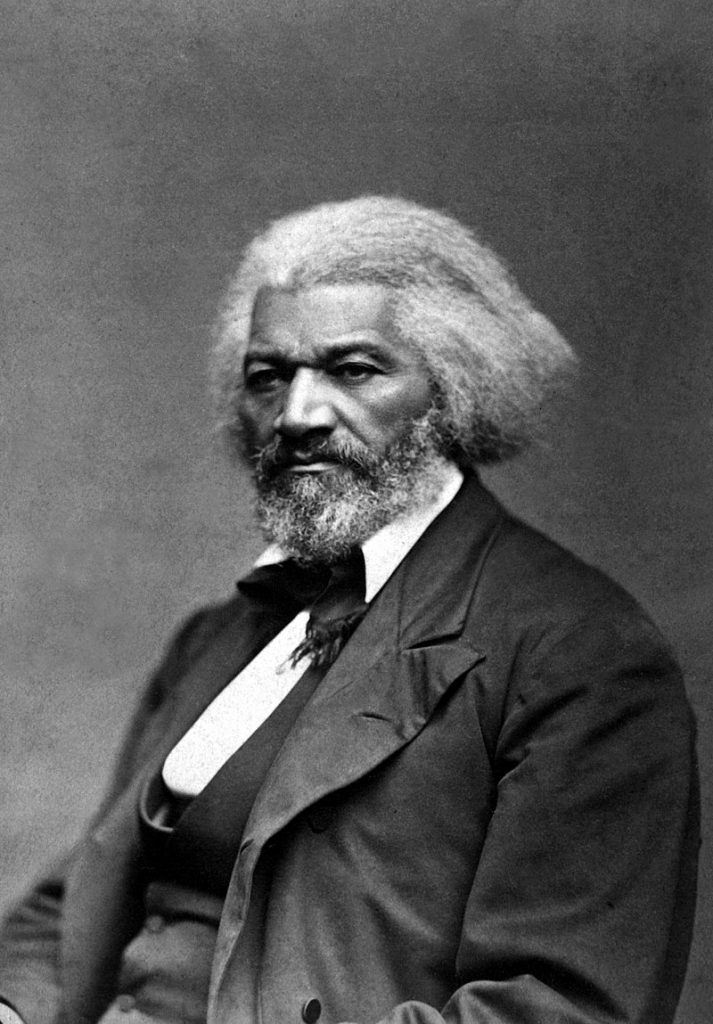
FROM WIKIPEDIA COMMONS
Frederick Douglass (born Frederick Augustus Washington Bailey; c. February 1818 – February 20, 1895) was an American social reformer, abolitionist, orator, writer, and statesman. After escaping from slavery in Maryland, he became a national leader of the abolitionist movement in Massachusetts and New York, becoming famous for his oratory and incisive antislavery writings. Accordingly, he was described by abolitionists in his time as a living counter-example to slaveholders’ arguments that slaves lacked the intellectual capacity to function as independent American citizens. Likewise, Northerners at the time found it hard to believe that such a great orator had once been a slave.
Douglass wrote several autobiographies, notably describing his experiences as a slave in his Narrative of the Life of Frederick Douglass, an American Slave (1845), which became a bestseller, and was influential in promoting the cause of abolition, as was his second book, My Bondage and My Freedom (1855). Following the Civil War, Douglass remained an active campaigner against slavery and wrote his last autobiography, Life and Times of Frederick Douglass. First published in 1881 and revised in 1892, three years before his death, the book covers events both during and after the Civil War. Douglass also actively supported women’s suffrage, and held several public offices. Without his approval, Douglass became the first African-American nominated for Vice President of the United States as the running mate and Vice Presidential nominee of Victoria Woodhull, on the Equal Rights Party ticket.
Douglass was a firm believer in the equality of all peoples, be they white, black, female, Native American, or Chinese immigrants. He was also a believer in dialogue and in making alliances across racial and ideological divides, as well as in the liberal values of the U.S. Constitution. When radical abolitionists, under the motto “No Union with Slaveholders,” criticized Douglass’ willingness to engage in dialogue with slave owners, he replied: “I would unite with anybody to do right and with nobody to do wrong.”
A Republican, Douglass served as United States Minister Resident to Haiti.
Every Year
1740s
1860s
1870s
1880s
1900s
1920s
1940s
- BORN 1940: JOHN ROBERT LEWIS (AMERICAN POLITICIAN; CIVIL RIGHTS LEADER)
- BORN 1946: ALAN RICKMAN (ACTOR)
- 1947: POLAROID INSTANT CAMERA FIRST DEMONSTRATED
1950s
1960s
1970s
- 1972: PRESIDENT NIXON BECAME THE FIRST U.S. PRESIDENT TO VISIT A COUNTRY NOT DIPLOMATICALLY RECOGNIZED BY THE U.S. WHEN HE VISITED CHINA
- BORN 1979: JENNIFER LOVE HEWITT (ACTRESS)
1980s
1990s
2000s
- DIED 2004: PRESIDENT GEORGE W. BUSH’S DOG, SPOTTY, DIED AT THE AGE OF 15. SHE WAS BORN IN 1989 IN THE WHITE HOUSE. HER MOTHER WAS MILLIE, THE WELL-KNOWN DOG OF BUSH’S PARENTS, FORMER PRESIDENT GEORGE H.W. BUSH AND HIS WIFE, BARBARA. SHE IS BELIEVED TO BE THE ONLY PET TO LIVE IN THE WHITE HOUSE TWICE
- DIED 2004: BART HOWARD (SONGWRITER KNOWN FOR WRITING FLY ME TO THE MOON)
2010s
- 2010: UFO SIGHTED IN PORTLAND, OREGON
- DIED 2018: BILLY GRAHAM (EVANGELIST)
- DIED 2019: PETER TORK (MUSICIAN, MEMBER OF THE MONKEES)
COURTESY www.almanac.com

Appreciate it for all your efforts that you have put in this. very interesting info .